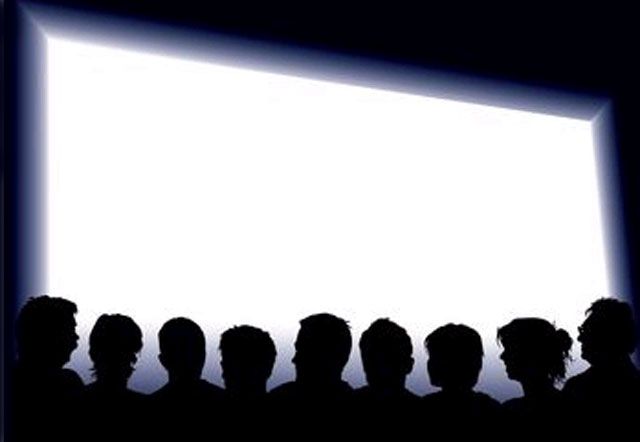It's not every day that movie theatres take retribution against a Hollywood studio.
The country's exhibitors historically have not wanted to antagonise studios upon whom they depend for an uninterrupted flow of movies that keep filmgoers lining up to buy tickets.
Yet payback is what happened last month when major theatre chains pulled the family-friendly animated comedy Cloudy With a Chance of Meatballs from big screens around the country. The action was intended as a warning shot across the bow against Sony Pictures — and Hollywood at large.
Sony simply wanted to make its movie, an adaptation of the best-selling children's book, available to owners of a new generation of the company's high-definition TVs an entire month before its release on DVD.
But movie theatres weren't having any of it. They feared that advancing the date when people could watch the movie at home would discourage them from seeing it in theatres.
Cloudy With a Chance of Meatballs, innocuous title notwithstanding, is the latest flash-point between Hollywood studios and theatre operators over the contentious issue of so-called "windows."
The friction is occurring despite the industry enjoying a banner year at the box office during a severe recession, with US attendance up nearly five per cent, an unexpected resurgence for a part of the business that had not been seen to be growing.
For decades, the studios have reaped huge financial gains by releasing their movies sequentially through a series of markets — windows, that force people to pay each time they want to see a film: First in theatres, months later on DVD, followed by video-on-demand and finally on cable channels like HBO, Showtime and Starz.
Now, under pressure from advances in digital technology, shifts in consumer demand and the spread of piracy, studios are re-examining the windows doctrine. Eventually, some executives suggest, the industry may no longer get several lucrative bites at the movie apple, but instead be forced to grab as much revenue as it can from a universally timed release.
The issue is prompting extensive conversations at every studio and stepped-up discussions with theatre owners as the industry grapples with the biggest change in movie industry economics since the introduction of home video more than 25 years ago.
"It's something we talk about every day," says Rick Finkelstein, Vice-Chairman of Universal Pictures. "People want to have more control over their entertainment."
Studios are shortening windows as they're looking to maximise the revenue they generate from movies in the face of a decline in profitable DVD sales due the recession and low-cost video rental outlets such as Netflix Inc and Redbox.
Warner Bros and other distributors, for example, have begun making their films available on video-on-demand cable services the same day — sometimes even before, they're released on DVD. Executives at NBC Universal's soon-to-be new owner, cable system operator Comcast Corp have conveyed their intent to offer movies earlier to their subscribers.
Exhibitors have long drawn a line in the sand, steadfastly resisting the compression of release patterns because they view it as a threat to their livelihood. They sound the alarms any time a studio attempts to release a movie on DVD fewer than 90 days after opening in theatres. Nonetheless, theatre executives now for the first time are at least acknowledging they may need to adapt.
"We're going to protect our side of the business," said Amy Miles, chief executive of Regal Entertainment Group, the nation's largest theatre circuit.
But, "We'd like to think that we'd work with the studios as business models evolved," she added.
It's a delicate balancing act for both parties.
Theatre operators want to be open to change without undercutting ticket sales, which is enjoying a record revenue. Above all, they want to be part of the conversation.
"We want to know what's going to happen and we want to have some input," said Tony Kerasotes, chief executive of Kerasotes Showplace Theatres and chairman of the National Association of Theatre Owners, a trade group.
For all their talk of change, however, studios say they're not ready to do away with windows entirely, fearing it could cannibalise their own business.
"People always say consumers want it all now, and Hollywood needs to change its business models," said Jim Gianopulos, co-chairman of Fox Filmed Entertainment. "But, I've yet to see anyone show up with a simultaneous release model that works."
The Fox chief added: "While there's value in the sequential windowing system, we shouldn't be slaves to it and we need to experiment and allow consumers to take advantage of new technologies and ways to experience movies conveniently."
For example, Fox supports offering subscribers one-time VOD (Video On Demand) viewings of movies in high-definition before their DVD release for a premium price of between $20 to $30. But, before that can happen, the studios have to make sure their content is protected from pirates.
Their lobbying arm, the Motion Picture Association of America, has been pressing the Federal Communications Commission for a waiver that clears the way for technology that would transmit movies through secure connections to the TV.
Not surprising, the MPAA's latest lobbying incensed exhibitors who charged that the proposal failed to specify how the window periods would be affected.
Tensions over the windows issue have been mounting for months.
Before the "Cloudy" flap, theatre owners balked when Sony said it wanted to release its Michael Jackson concert film This Is It early on DVD during the holidays. When exhibitors claimed that it was too soon after the film's theatrical premiere, Sony relented.
In October, Paramount Pictures angered exhibitors when it announced it would release its summer blockbuster GI Joe: The Rise of Cobra on DVD fewer than three months after its debut in cinemas.
Also in October, Walt Disney Co Chief Executive Bob Iger revisited a notion he first broached in 2005, suggesting that studios may need to make DVDs available sooner to conform to changing consumer needs.
The following month Iger made a fundamental change in the company's organisation by putting former DVD chief Bob Chapek in charge of all distribution for Disney movies, not only theatres.
"We're looking across all the revenue streams to find ways to optimise the total size of the pie," said Chapek, suggesting the current business model where studios wait an average of four months before they release DVDs is outdated.
"The economics just don't make sense," he said, noting most movies make 80 per cent of their revenue in the first three weeks. "Studios are sitting on their hands for three months while the only ones who can exploit the product are pirates."
The average period between a film's theatrical and DVD releases has narrowed by a month over the last decade, reflecting the much shorter box office run of movies that typically open on thousands of screens to satisfy demand.
Studios and theatre executives admit they have no idea where the future lies. But, they claim they want to try to figure it out together.
"I really believe the major studios and major exhibitors are going to sit down and work something out that we can both live with," said David Passman, chief executive of Carmike Cinemas.













